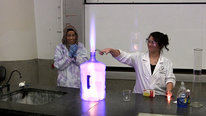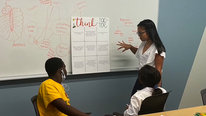- Nick Kim
- Post-Doctoral Research Associate
- Presenter’s NSFRESOURCECENTERS
- University of Tennessee
- Lynn Hodge
- https://tpte.utk.edu/people/lynn-hodge-phd/
- Professor and Director
- Presenter’s NSFRESOURCECENTERS
- University of Tennessee, Center for Enhancing Education in Math and Science, UTK...
VolsTeach for Appalachia (VFA)
NSF Awards: 1758325
2022 (see original presentation & discussion)
Grades 6-8, Grades 9-12, Undergraduate
Our video presentation is the VolsTeach for Appalachia project - addressing the shortage of math and science teachers in East Tennessee. The overarching goal of this NSF-funded project is to support community college students, through unique experiences, in becoming exceptional STEM teachers in rural East Tennessee schools. We share the key features of the project and our progress through year 4. These key features of the project include recruitment through internships and courses that introduce STEM teaching early on and teacher preparation that focuses on K-12 students (who they are and who they would like to be), math and science content, and the characteristics and interests of our East Tennessee communities. In addition, our second cohort has completed their VFA internship. This video focuses on our commitment to cultural responsive education as well as program improvement through focus group interviews. Thank you for checking out our presentation.
Related Content for VolsTeach for Appalachia: Becoming a STEM Teacher
-
 2021VolsTeach for Appalachia: Becoming a STEM Teacher
2021VolsTeach for Appalachia: Becoming a STEM Teacher
Nicholas Kim
-
 2020VolsTeach for Appalachia: Becoming a STEM teacher
2020VolsTeach for Appalachia: Becoming a STEM teacher
Nick Kim
-
 2019VolsTeach for Appalachia
2019VolsTeach for Appalachia
Lynn Hodge
-
 2016Hands On Science Teaching
2016Hands On Science Teaching
Jeffery Seitz
-
 2016Recruiting STEM Teachers: UT Tyler UTeach
2016Recruiting STEM Teachers: UT Tyler UTeach
Michael Odell
-
 2022Rural Integrated STEM Education (RISE) Ready
2022Rural Integrated STEM Education (RISE) Ready
Corin Slown
-
 2020Early Career Noyce Teachers’ Self-Efficacy
2020Early Career Noyce Teachers’ Self-Efficacy
Jessica Gale
-
 2022WATERWORKS: ATTRACTING A DIVERSE WORKFORCE
2022WATERWORKS: ATTRACTING A DIVERSE WORKFORCE
Kauser Jahan
Playlist: Noyce Videos Playlist 2022
-
 2022teachHOUSTON: The Journey of a STEM Teacher
2022teachHOUSTON: The Journey of a STEM Teacher
Paige Evans
-
 2022Integrating Technology for Meaningful Pedagogical Strategies
2022Integrating Technology for Meaningful Pedagogical Strategies
Salvatore Garofalo
-
 2022Building a Cross-Generational Community of STEM Educators
2022Building a Cross-Generational Community of STEM Educators
Kelly Costner
-
 2022The RESULT: Preparing teachers for Culturally Relevant STEM
2022The RESULT: Preparing teachers for Culturally Relevant STEM
Theresa Robinson
-
 2022Noyce Ambassadors Program: A Pre-Service Model
2022Noyce Ambassadors Program: A Pre-Service Model
Audrey Cohan
-
 2022RALLY for STEM
2022RALLY for STEM
Danielle Dani
-
 2022Improving teaching practices by reducing bias
2022Improving teaching practices by reducing bias
Rhonda Christensen
-
 2022FRESHKILLS PARK X TEACHER PD
2022FRESHKILLS PARK X TEACHER PD
Faiza Peetz
-
 2022Get the Facts Out: Repairing the Reputation of STEM Teaching
2022Get the Facts Out: Repairing the Reputation of STEM Teaching
Wendy Adams
-
 2022Impacts of STEMS^2
2022Impacts of STEMS^2
Tara ONeill
-
 2022STEM Research Inquiry Summer Enrichment (STEM RISE)
2022STEM Research Inquiry Summer Enrichment (STEM RISE)
Mariam Manuel
-
 2022Development of Teacher Leaders in High-Need Urban Schools
2022Development of Teacher Leaders in High-Need Urban Schools
Anne Papakonstantinou
-
 2022Rural Integrated STEM Education (RISE) Ready
2022Rural Integrated STEM Education (RISE) Ready
Corin Slown
-
 2022Clarkson Noyce STEM For All Video ShowCase 2022
2022Clarkson Noyce STEM For All Video ShowCase 2022
Seema Rivera
-
 2022Developing STEM Teachers Through Interdisciplinary Research
2022Developing STEM Teachers Through Interdisciplinary Research
Kwame Owusu-Daaku
-
 2022Preparing STEM Teachers for Rural Places
2022Preparing STEM Teachers for Rural Places
Earl Legleiter
-
 2022We're REGAL!
2022We're REGAL!
Ayanna Shivers
-
 2022VolsTeach for Appalachia: Becoming a STEM Teacher
2022VolsTeach for Appalachia: Becoming a STEM Teacher
Nick Kim
-
 2022Teacher Leaders: Hands-on STEM Lessons During the Pandemic
2022Teacher Leaders: Hands-on STEM Lessons During the Pandemic
Amanda Gunning
-
 2022Learning transfer from teach-to-avatar to classroom practice
2022Learning transfer from teach-to-avatar to classroom practice
Minkyoung Kim


David May
Hi Nick. Great video and exciting program! Question: Have you found it challenging to recruit students to the program? It looks like you have quite a few, which is fantastic.
My project (Get the Facts Out) is about helping recruit students to STEM teaching, and we're actually trying to expand our work with 4-year colleges to 2-year colleges. Perhaps we can work together!
Nick Kim
Post-Doctoral Research Associate
Hello David,
Yes, recruitment has been challenging to say the least. You really need to partner with one or more local community colleges in order to to get the word out about the opportunity. We've tried to go outside of East Tennessee to recruit but haven't had any luck since most community college students attend their local CC and don't want to transfer to a large university away from their home. Let me know how I can help!
David May
Corin Slown
Hi Nick! I agree-connecting learning with making learning personal is critical. As you recruit community college students to the teaching pathway, I am curious what your first point of contact is with students you recruit? Thanks!
Nick Kim
Post-Doctoral Research Associate
Hello Corin,
We partnered with a local community college initially when writing the grant, so they were the first point of contact. In the first year, we actually went to the community college mathematics classes and promoted our program in a short 5 minute spiel. For other community colleges, we contacted anyone from professors we've worked with in the past as well as advisors.
Nick Kim
Post-Doctoral Research Associate
Hello all,
Thank you for stopping by our page and viewing our video. Recruitment has definitely been a challenge as we are in our 4-5th year because we didn't have as many candidates as we hoped. It has really been a great program and has helped countless preservice teachers.
David May
Tabatha Rainwater
Great video, Nick! The students' culturally relevant pedagogical knowledge gave me goosebumps.
Nick Kim
Post-Doctoral Research Associate
Thanks! They had great guest speakers to inform them!
Joan Ferrini-Mundy
University President
Great work. The model of bringing community college students into teaching seems very wise and could allow for building capacity in specific local communities. Can you tell us more about impact - whether students are moving through the program and into positions/obtaining teaching credentials? The focus on high expectations is also good; do the participants have any specific challenges as they work to introduce and hold high expectations K-12 classrooms, and what strategies do you offer to support their efforts?
I will confess that I had to think for a minute about why it's called "Vols Teach" - got it!
Nick Kim
Post-Doctoral Research Associate
Hello Joan,
Currently, VFA has graduated 4-5 preservice teachers all with teaching positions here in East Tennessee or with teaching certification (One scholar decided to take a year traveling before teaching). The scholars do not all have associate degrees from a community college, some just have community college experiences but have transferred to the University of Tennessee. VolsTeach for Appalachia scholars are working with the VolsTeach faculty to use culturally responsive practices to keep students engaged in the material. When students are engrossed in meaningful/relevant STEM curriculum do rise to the expectations of the teacher. Most of our scholars have not completed their apprentice teacher (student-teaching internship), so there classroom time has been limited due to Covid-19.
Joi Spencer
Interim Dean and Professor of Mathematics Education
Thanks so much for sharing this project with us. I would love to learn more about what you consider to be the most outstanding features of your teacher preparation program. I notice that participants were discussing culturally responsive pedagogy. Do these participants engage in activities where they examine and reflect upon their own cultural practices, ideas and beliefs? Have they written positionality statements, for example? I am curious about how the teachers will bring their cultural selves to the activity of teaching.
Nick Kim
Post-Doctoral Research Associate
Hello Joi,
Before the pandemic, I would say early and often classroom experiences was one of our most outstanding features of our TPP. Our scholars do reflect upon their own cultural practice, ideas, and beliefs, but have not written positionality statements unless they are in their last semester of the program. That is an interesting point, and something I want to explore in this 5th year. The VolsTeach faculty try to emphasize the importance of understanding one's cultural self while considering the different cultures of others.
Tichina Ward-Pratt
Educator
Awesome program. I appreciate the focus on culturalIy relevant pedagogy. It is mentioned that this program was created to address the shortage of math teachers in East Tennessee. I am wondering what was the motivation for starting this program with a focus on culturally relevant pedagogy and was there an attempt to recruit teachers that reflected similar backgrounds of the students they would teach in East Tennessee?
Nick Kim
Post-Doctoral Research Associate
Hello Tichina,
I'm not sure if the initial thought when submitting this proposal was to incorporate CRP, but we did want to focus on bringing in local East Tennessee community college students in to represent their communities. The CRP focus really began 2 years ago, and we are still trying to incorporate it in practical ways.
Tracy Holbrook
Hello Nick! I was born in the "heart of Appalachia", just a couple of hours away from your campus near the tri-cities area. After graduating from high school, attending a community college, then transferring to a university, I ended up teaching chemistry and chemical technology at Cape Fear Community College in Wilmington, NC. I wish we were closer to each other! Our program is crafted to meet the needs of industry partners, but we do have students that are interested in teaching or would see this as a possible career option. It would be curious to know feedback from students in transfer pathways at CCs versus those in STEM career (CTE) pathways. Keep up the excellent work!
Nick Kim
Post-Doctoral Research Associate
Hello Tracy, that is an interesting prompt. Most of our CC students have transferred to UTK before earning there associates degree but something to consider for sure.
Ayanna Shivers
Hello, Nick! I truly enjoyed learning about your program. We are entering our 3rd year of our NOYCE project and would like to recruit more from our community college partner. Do you have any suggestions?
Nick Kim
Post-Doctoral Research Associate
Recruiting definitely has been one of our toughest obstacles. That's why we are in our 5th year when we originally thought the project would last 3 years.
We partnered with a local community college initially when writing the grant, so they were the first point of contact. In the first year, we actually went to the community college mathematics classes and promoted our program in a short 5 minute spiel. For other community colleges, we contacted anyone from professors we've worked with in the past as well as advisors. We also went across the state and spoke with middle and west Tennessee CCs but did not have much luck. I believe most CC students want to stay in their local communities as much as they can. Good luck!
Further posting is closed as the event has ended.